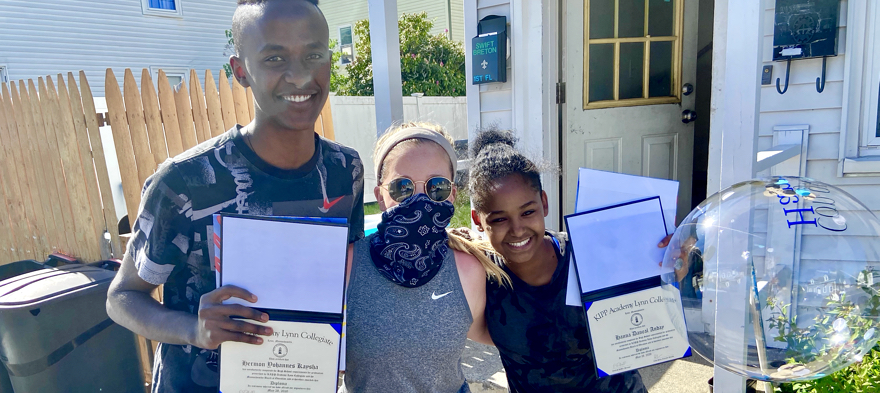
Jun 15, 2020 12:20:00 PM
On May 28th, my fellow classmates and I graduated from KIPP Academy Lynn Collegiate, part of a K-12 charter public school network in Lynn, Massachusetts. It was a hard moment for us. We couldn’t embrace each other and express affection the way we used to. Leading up to graduation, we didn't have the chance to wear our lovely prom outfits. My first date was supposed to be on prom night, but it didn't happen. That means I'm the guy who graduated without ever going on a date in my whole four years of high school! If other graduates are reading this piece, I hope this makes you feel a little better about your situation.
My classmates and I, like so many other seniors across this country, didn't have the opportunity to cross the stage and collect our diplomas together. I'm not going to lie, I was so frustrated at first. I really felt that we were part of the most unfortunate class ever—until I realized something. [pullquote]This is not the first time that we’ve faced difficulties; in fact, most of us have had to overcome so many obstacles to be where we are today.[/pullquote]

Some of us have to work to support our families. Others have had to take care of our siblings after school, or didn’t have a home at some point in our lives. Many of us, as minorities in this country, have had to—and continue to—endure racism and stereotyping.
The realization that our current situation, while less-than-ideal, was nothing compared to what we had endured to make it to high school graduation, really hit home for me. My parents emigrated from Ethiopia and left me with my grandparents when I was one year old. I remember always asking my grandparents, “Why did my parents leave me?” They always replied, “to have better opportunities and a better life.”
When I finally arrived in the United States to join them, I was curious to see if the reasons why my parents had left Ethiopia to come to this country had come true. When I arrived, nothing was what I expected. Although my mother was seven months pregnant, she was still working long hours in order to pay rent. [pullquote position="right"]I wondered, “where are the opportunities she came for?”[/pullquote] I realized that one of the main reasons my mother was struggling was because she did not speak English. It was at that moment that I internalized the fact that the English language was key not only for my survival, but also to provide economic security for my family.
Shortly after my arrival, my mother stopped working to have my second brother and separated from my step-father. As a result, we lost our home when we could not afford to pay the rent and needed to stay in the hospital after she gave birth. This time was bittersweet: Bitter because we had no home to return to after my mom left the hospital, but sweet because I had a new baby brother.
I realized that he and I had a lot in common: he was new to this world, and so was I. Neither of us knew our place in this country, and we both had to learn a new language. He had to learn how to walk, and I had to learn how to walk in this new place. This time demonstrated to me how much I needed to learn in order to set my youngest brother up for success.
Although we found temporary shelter for our family, my mom’s lingering illnesses required me to step up and become the foundation of our household. I shopped for our entire family with a $400 budget. While we had limited time to cook in the shelter, I cooked two separate dinners—one for me and my mom and one for my younger siblings. I cleaned the entire house every Saturday because I wanted to keep my brothers healthy. I filled out housing applications weekly for low-income families and practiced speaking English with our roommates in our shelter. [pullquote]This level of responsibility, on top of making sure that I was doing all my school work, required that I manage my time and value each minute.[/pullquote] I am fortunate that despite these challenges, I am now a proud graduate, on my way to MIT in the fall.
And I know that my story is not unique. So many of my fellow graduates at KIPP and all public schools across the country share similar struggles. However, [pullquote position="right"]these situations have not stopped us from being the amazing students, athletes, mentors and graduates that we are today.[/pullquote] They have not stopped us from making the Class of 2020 the best class ever.
These challenges have galvanized our resilience and motivated us to achieve even more. Our individual and collective strength is a result of the adversity we faced. And today, too, we need this resilience to celebrate our graduation. One of my favorite quotes is courtesy of one of my KIPP classmates, Sophie, who said to us in class one day: "Don't let your education stop you from learning."
At this time, I’d like to amend her quote to “Don't let the coronavirus stop you from having the best graduation PERIOD.” The Class of 2020 has overcome so much, and I hope everyone is able to celebrate their success and reflect on all the hard work that has made it possible.
Hermon Kaysha is a graduate of KIPP Academy Lynn Collegiate. At KIPP, Hermon started the Math Club and was a teaching assistant in precalculus. He recently received a QuestBridge scholarship to the Massachusetts Institute of Technology (MIT). He intends to major in math and hopes to discover his own theorem one day.
Few issues in education spark more tension and debate than standardized testing. Are they a tool for equity or a burden on students? A necessary check on school systems or a flawed measure of...
Charter schools are public schools with a purpose. Operating independently from traditional school districts, they're tuition-free, open to all students, and publicly funded—but with more flexibility...
Despite the benefits of a diverse teaching force, prospective teachers of color fall out of our leaky preparation pipeline at every stage: preparation, hiring, induction, and retention. Here’s what...
Ed Post is the flagship website platform of brightbeam, a 501(c3) network of education activists and influencers demanding a better education and a brighter future for every child.
© 2020-2025 brightbeam. All rights reserved.
Leave a Comment